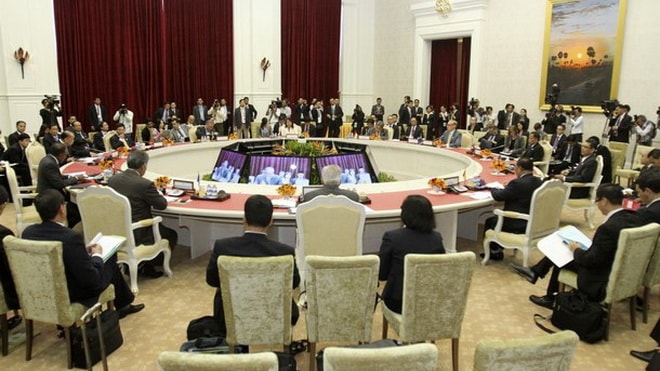China does not want to discuss the East Sea at the ASEAN Regional Security Forum (ARF).
Beijing has voiced its opposition to bringing the East Sea issue up for discussion at the ASEAN Regional Security Forum (ARF), which opened on July 12 with the participation of the US, Russia, Japan, Canada and several other countries outside the bloc.
 |
Overview of the ASEAN Foreign Ministers' Meeting in Phnom Penh, Cambodia - Photo: Reuters |
“The East Sea issue is not an issue between China and ASEAN, but between China and some ASEAN countries,” Xinhua news agency quoted Chinese Foreign Ministry spokesman Liu Weimin as saying on July 10. “Making a big deal out of the East Sea issue is contrary to the people’s aspirations and the mainstream tendency of seeking cooperation and development, and is an attempt to turn China-ASEAN relations into a hostage to this issue.”
The East Sea issue, according to AFP, is not on the official agenda of the ARF, but will be raised informally by some countries and will be discussed in a separate ASEAN-China dialogue on July 11.
The ASEAN ministerial meeting, currently chaired by Cambodia, has aimed at a code of conduct for the South China Sea, but China is not interested in negotiating and has rejected any international intervention in resolving the dispute. Beijing says it wants to discuss bilateral differences with each country involved.
“The ARF foreign ministers' meeting is an important forum for building mutual trust and enhancing cooperation, it is not the appropriate place to discuss the East Sea issue,” Mr. Liu said.
On July 11, the Chinese Ministry of National Defense's website posted a notice about an "annual" military exercise by the country's military in the Zhoushan Islands opposite Zhejiang Province, not far from Shanghai. The defense ministry did not provide further details about the exercise, but issued a travel ban for civilian vessels in the area, according to China Daily.
The exercise comes after Japanese Prime Minister Yoshihiko Noda said last week that his country is considering buying a series of islands in the disputed waters with China and Taiwan, which Japan calls Senkaku and China calls Diaoyu. Tokyo also plans to host a summit with ASEAN next year to strengthen maritime security cooperation, Kyodo News reported on July 10. Japanese Foreign Minister Koichiro Genba is expected to announce the plan in Cambodia.
A US State Department official has just announced that the US is ready to defend Japan if the Senkaku Islands are attacked.
At the conference, Japan and ASEAN are likely to issue a joint statement that will serve as a framework for maritime security cooperation. In Phnom Penh, Cambodia, US Secretary of State Hillary Clinton called for discussions on the South China Sea. She said the US would raise the issue at meetings of the ARF of 26 Asia-Pacific countries and the European Union. Speaking in Hanoi before leaving for Phnom Penh, Clinton said the maritime disputes were “a major issue,” according to AFP.
“The Sino-US relationship is like locking an elephant in the room,” Bloomberg news agency quoted Ernest Bower and Prashanth Parameswaran of the Center for Strategic and International Studies in Washington in a study published on July 9. “ASEAN countries continue to worry that tensions between a rebalancing America in Asia and a rising China will affect peace and stability in the region and drag them into disputes.”
According to Tuoi Tre - H






